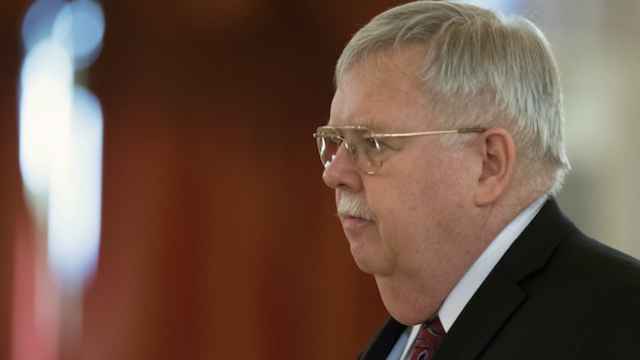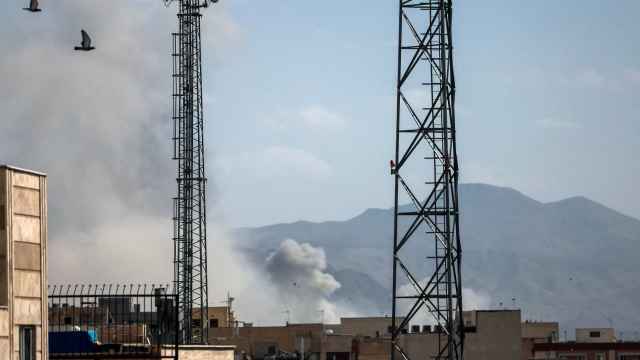When Russians crossed the border to fight with rebels in eastern Ukraine earlier this year, Moscow said the soldiers had not been deployed but had gone on their own vacation time.
When Estonia was the victim of a cyber attack in 2007 and blamed Moscow, the Kremlin responded that it could not always control patriotic Russian hackers.
Western strategists who built their defenses to counter a massive invasion, nuclear missiles or terrorism are still trying to work out how to cope with this sort of threat that disrupts and destabilizes from behind a mask of deniability.
After soldiers without insignia took control in Crimea last March, Western military officials developed their own nickname for Russian personnel operating in unmarked uniforms or in plainclothes: Little Green Men.
NATO is considering how to counter such "ambiguous warfare" techniques should President Vladimir Putin try something similar in the Baltic member states of Lithuania, Latvia and Estonia.
It has deployed some U.S. and allied tanks and planes there to signal NATO's commitment to defend all its members with force and is considering bolstering police there, perhaps with officers from Nordic states, to help detect any Russian infiltration.
Effective Russian Strategy
Military experts say Russia's unconventional strategy on its western flank, especially in non-NATO member Ukraine, is proving remarkably effective, and it has recently been combined with a global show of force on a scale not seen since the Cold War.
Russian warships probed the limits of Australian territorial waters before the G20 summit in Brisbane this month and Moscow said nuclear bomber patrols which have been overflying western Europe would now reach as far as the Gulf of Mexico.
Russia's underlying point, Western analysts say, is clear: as it reasserts its influence over countries on its borders, it is reminding the West of how cataclysmic the consequences could be if military force were used to stop them.
"Putin is taking the measure of the West's willingness to keep exerting pressure on Ukraine," said Nikolas Gvosdev, professor of national security studies at the U.S. Naval War College in Newport, Rhode Island.
Many officials and experts say privately that both the West and the government in Kiev ultimately will have to accept greater federalism and a Russian influence in eastern Ukraine.
The issue will then be whether Putin interprets it as a sign of weakness and a green light to consider similar tactics against NATO members like the Baltic states.
Evolving Western Strategy
"It's not quite a new Cold War, but it's a very different situation to where we were a few years ago," said Elbridge Colby, a former Pentagon official and now senior fellow with the Center for a New American Security. "I don't think we've yet formulated a proper strategy for dealing with that."
The West's biggest response to Moscow's actions has been financial sanctions on Russian firms and individuals and the new, if limited, military deployments in eastern Europe. Further measures are now being discussed in NATO meetings.
U.S. Supreme Allied Commander Philip Breedlove makes clear covert infiltration by Russia could draw a military response under Article 5 of NATO's founding treaty, which sees an attack on one member as an attack on the alliance as a whole.
"If we see these actions taking place in a NATO nation and we are able to attribute them to an aggressor nation, that is Article 5. Now, it is a military response," he said in an interview with the German newspaper Die Welt earlier this year.
The emphasis for NATO in Europe, home to more than half the world's atomic weapons, remains detecting any Russian initiatives early and responding firmly to avert any risk of actual war.
"What you have to remember is that there is simply no option for a conventional war with Russia," said one former official on condition of anonymity. "It is either unconventional like this or it is likely to become something much worse."
A Message from The Moscow Times:
Dear readers,
We are facing unprecedented challenges. Russia's Prosecutor General's Office has designated The Moscow Times as an "undesirable" organization, criminalizing our work and putting our staff at risk of prosecution. This follows our earlier unjust labeling as a "foreign agent."
These actions are direct attempts to silence independent journalism in Russia. The authorities claim our work "discredits the decisions of the Russian leadership." We see things differently: we strive to provide accurate, unbiased reporting on Russia.
We, the journalists of The Moscow Times, refuse to be silenced. But to continue our work, we need your help.
Your support, no matter how small, makes a world of difference. If you can, please support us monthly starting from just $2. It's quick to set up, and every contribution makes a significant impact.
By supporting The Moscow Times, you're defending open, independent journalism in the face of repression. Thank you for standing with us.
Remind me later.





